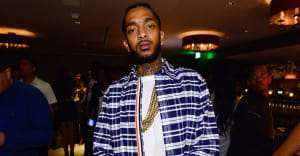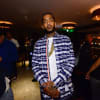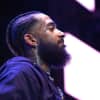The last song on Crenshaw is a drumless piano number called “Crenshaw and Slauson (True Story).” It comes after 75 minutes of material — which themselves followed a run of three mixtapes in 12 months — and so it’s jarring that, a few bars in, Nipsey Hussle is piecing out shards of autobiography you’ve never heard before. He raps about the gleaming white Lincoln he had in 2003, when he was 18, and the black .40 he kept tucked under his pillow while he slept; he raps about selling the Lincoln for a “grocery bag of cash” that he took to Sam Ash to buy a microphone and Pro Tools.
That was the beginning. He builds the memory one detail at a time: guns buried under floorboards, a useless check from his ill-fated deal with Epic Records, “screens on every wall with 16 camera angles.” He leaves out most of the proper nouns, citing statutes of limitations.
Then he goes back further: to the school pictures where he’s beaming in ways he can’t get his face to anymore, to the neighbors’ rooster that used to wake him and his mother up in the early ‘90s. Now his face is stuck in a grimace, hands and middlemen always in motion, only taking breaks to watch Belly.
“Crenshaw and Slauson” is named for the nexus of Nipsey Hussle’s empire. It’s also the intersection at which he was murdered yesterday, at the age of 33. The song isn’t pounding or punishing the way so much of his celebrated work is, but it hints at the emotional skeleton that makes those louder songs connect so well. “I had a vision that nobody else could see,” he raps, and you believe him, like the people in his life clearly believed him at 18.
The thing about L.A. is that it’s so big it can be hard to keep track of the way each pocket is growing, decaying, and regenerating. When new rap stars bubble up, they can tweak how their neighborhoods are seen in the mind’s eye of people who live an hour away in traffic. Nipsey’s version of the 60s was sunny, oppressive, violent in ways both random and crushingly, depressingly predictable. In videos he would stalk around, his impossibly skinny frame covered in expensive fabrics or just in ink, as if simply being outside was a provocative act.
There’s truth to that, of course, but in his adult life Nipsey was an ever-present figure in L.A., accessible in ways that made wealth and independence seem attainable and made his music feel like a civic good. The last record he released, his first with Atlantic Records, was nominated for a Grammy. It was the culmination of more than a decade of work that saw him grow from industrious also-ran to a local legend more recognizable than anyone on city council. The publicists, careful to frame their new client the right way, called it his debut album. Nipsey called it Victory Lap.
Eleven years before those Grammys, in the summer of 2008, Nipsey uploaded the first volume of his Bullets Ain’t Got No Name mixtape series. Two came that winter and Three the following August. By the end of that string, Nipsey had a modest but excited local following; the year after, in 2010, he cracked the code to his own music, and The Marathon made him something like a star. That’s the tape that has the soaring “Keys 2 the City” and the grim “Blue Laces.” Nipsey wrote about dodging bullets and buying belts in a way that highlighted the effort in each. Everything was work, even his voice would strain.
While he liked to cultivate the image of the outsider and underdog, Nipsey became, strangely, one of the few constants over the last decade of L.A. rap. He came out when young rappers were either jerking or fighting over beats that could conceivably be Detox scraps. As the 2000s became the 2010s, Blu punted on stardom, Game retreated into expensive fan fiction, and YG languished on the shelf at Def Jam; Nipsey barrelled ahead, getting a little more polished, a little more daring on each project. He loved beats that sounded expensive, like they were made on and/or designed for yachts. (His collaborations with Rick Ross were no accident.) They would bend toward early- and mid-’90s L.A. production styles or to whatever was popular at the moment, but the spine was a big, bold, dramatic maximalism. He figured out how to cut through those beats with a rasp that sounded small, wearied, and unbelievably authoritative.
Nipsey’s DNA made him steady and ceaseless, but if there was one inflection point that broke him in the national consciousness, it was his 2013 mixtape Crenshaw and the economic model he built for it. At a moment when the blog circuit had fully swallowed traditional distribution models (and before streaming platforms had injected massive revenues back into the major labels), Nipsey announced that he was pressing 1,000 copies of his new mixtape and selling them for $100. You should have seen the comment sections. But it sold out; the banner headline was Jay-Z’s purchase, for $10,000, of 100 copies. It was the opposite of Kendrick Lamar’s explosive debut the year before: it was a steady war waged on balance sheets and in real estate holdings, on a long timeline and without any infrastructural support that Nipsey hadn't built for himself.
While his songs are deeply felt and sure to hold up over time, Nipsey’s business ventures and charitable programs, all of which he cast as part of a larger whole, are central to his legacy. The clothing store and the tech initiatives for youth in his community, the sneaker giveaways and the funeral arrangements that were paid in full. There is, of course, the argument that financial liberation is not necessarily true liberation (or, alternately, that the former is not really possible without the latter). It doesn’t seem like Nipsey disagreed; he was simply focused on sustainable wealth, concentrated in Black communities, because it was something material and measurable that he could study, execute, and pass on. All the way back in 2010, on “Keys 2 the City,” he quipped that “being broke is so un-American.” That’s reductive, ugly, and true.
It is impossible to live in Los Angeles and not understand Nipsey as a real, corporeal presence. One of the radio stations cleared their playlists and did nonstop blocks of Nipsey, broken up by calls from shocked, sorrowful listeners. One of the DJs choked up on air. Downtown last night, small groups of people congregated on corners and played his songs out of portable speakers; at the corner where was killed, hundreds and hundreds of people gathered to mourn. There are businesses Nipsey built and staffed himself, and if you asked anyone in the city about him — I mean before his death, going back years — you would think he did it with his bare hands. Earlier this year, Forbes interviewed Nipsey, and he reflected on the different roles he’d played in this exact spot. “Before we was renting here, I was hustling in this parking lot,” he said, before adding: “It's just always been a hub for local entrepreneurs.” You can imagine Nipsey’s deadpan when he said it, but I have no doubt that Nipsey was absolutely serious.
That Nipsey’s life would end in that very parking lot seems too cruel, too symmetrical. He alluded to his death in his writing — who, having lived his life, wouldn’t? — but the self is not what he wanted to mythologize. Nipsey wasn’t trafficking in parables or trying to be a God figure. He had blueprints. He had sales associate jobs and open spots in his barbershop. He romanticized the dull, incremental, frustrating disciplines that he had developed in an effort to leave something better for his kids. The point was not that he alone had risen to impossible heights, it was that with a little direction you, too, could step outside and take a look at everything you’d built.


